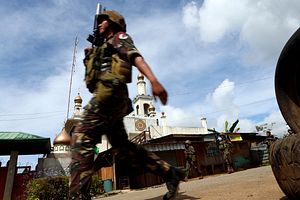The inauguration of the Bangsamoro Transition Authority (BTA) was heralded as a “new dawn” for Mindanao.
This auspicious event in March 2019 followed the ratification of the Bangsamoro Organic Law (BOL) a month earlier, creating the new Bangsamoro Autonomous Region in Muslim Mindanao (BARMM).
The past year demonstrated the resolve of the BTA in creating a stable economic environment for the BARMM. Three items in their list of achievements for 2019 bode particularly well for the economic prospects of the autonomous region. First, the Bangsamoro Energy Forum initiated efforts to develop sustainable energy sources in the region. Second, the Bangsamoro Tourism Stakeholders’ Summit signified the importance of tourism in grassroots development in the region. And third, a high investment record for the BARMM indicates growing business confidence for the region.
If the BTA continues laying down a strong foundation for the first elected Bangsamoro Parliament in 2022, the status of the BARMM as the poorest region in the Philippines could dramatically change within the decade.
Yet this positive trajectory can still be scuttled by spoilers, the most dangerous and imminent of which is violent extremism.
It’s worth remembering that in 2017 one of the region’s bustling cities, Marawi, was attacked by violent extremists and the ensuing battle with the military eventually led to its near-total destruction. The cost for the city’s rehabilitation is pegged at 72 billion pesos.
Without a doubt, another incident like the Marawi siege would be a huge setback for the BARMM.
As to be expected, the enhancement of regional security is part of the 12-point agenda set by the BTA for the transition period. Part of this objective is to make preventing violent extremism in the BARMM a high priority.
Pertinently, the national government of the Philippines is still struggling with preventing violence extremism. One of the reasons for this is “poor coordination” within the bureaucracy in addressing this particular issue. Experts in the field of national security agree that there is an urgent need to “harmonize all intra- and inter-agency programs, plans and activities ranging from counter-radicalization to counterterrorism.”
On the national level, this lack of a unified approach is supposed to be remedied by the issuance of the National Action Plan on Preventing and Countering Violent Extremism (NAP).
The fundamental purpose of the NAP is to foster cooperation and coordination among government agencies, the private sector, and civil society in preventing violence extremism in the country. It particularly aims to provide a coherent framework for policy and programming at the national, regional and local levels.
For preventing violent extremism in the BARMM therefore, it behoves the BTA to pay particular attention to the intergovernmental relations mechanisms established by the BOL, more specifically the National Government-Bangsamoro Government Intergovernmental Relations Body (IGRB). In theory, the IGRB can be a venue for cooperation and collaboration between the national government and the Bangsamoro government in both policymaking and program execution.
But it is worth noting that cooperation and collaboration by and between the central government and local governments have yet to be instinctively and consistently practiced despite the fact that intergovernmental relations mechanisms can be found in the nation’s charter and in various laws.
Nevertheless, the Terms of Reference agreed upon by the central government and the BTA provide that part the IGRB’s mandate is to “Coordinate and resolve issues relating to or arising out of the implementation of national programs and projects of the National Government programs in the BARMM” (Article II, Section 2(b)). Obviously, the IGRB can be properly tasked with managing the implementation of the NAP in the BARMM.
Furthermore, the composition of the IGRB actually makes it well positioned to operationalize the whole-of-government approach imposed by the NAP. It is co-chaired by Education Minister Mohagher Iqbal for the BTA and by Finance Secretary Carlos Dominguez III for the central government. As per the Terms of Reference, below is the full composition of the IGRB. (Article I, Section 2):
For the BARMM side: Bangsamoro parliament speaker, executive secretary, cabinet secretary, interior and local government minister, public works minister, social services minister, agriculture, fisheries, and agrarian reform minister, transportation and communications minister, and the environment, natural resources, and energy minister.
For the national government: presidential adviser on peace, reconciliation, and unity; socioeconomic planning secretary; secretaries for interior and local government, national defense, public works, energy, agriculture, transportation; and the cabinet secretary.
Clearly, the IGRB can forge a holistic and coherent arrangement covering a wide spectrum of deliverables required to ensure the success of preventing violent extremism, such as improving education, strengthening social welfare, conserving natural resources, expanding entrepreneurship and employment, and ensuring food security in the BARMM.
More importantly, it has the authority and funding to implement a cooperative partnership not just between the central government and the BTA, but crucially with the local governments, civil society organizations, and the business sector in the region as well.
There is indeed a common view within the BARMM that the IGRB has the potential to bring a lot of good changes to the region. But this potential will remain unrealized if the IGRB is not utilized in the right way.
The leadership of the BTA and the administration of President Rodrigo Duterte should realize that it makes perfect sense for the IGRB to tackle the challenge of establishing a coherent approach to countering violent extremism in the BARMM.
And the sooner the IGRB takes on this mantle, the better for the Bangsamoro people.
Michael Henry Yusingco is a senior research fellow at the Ateneo School of Government and at the Institute for Autonomy and Governance and a legislative and policy consultant.

































